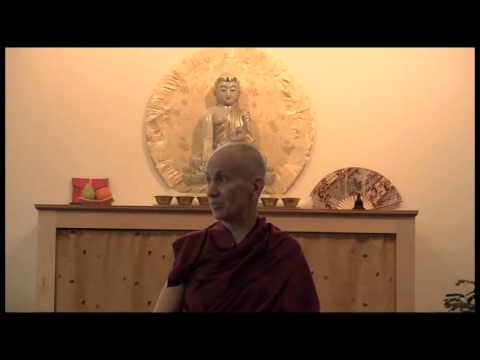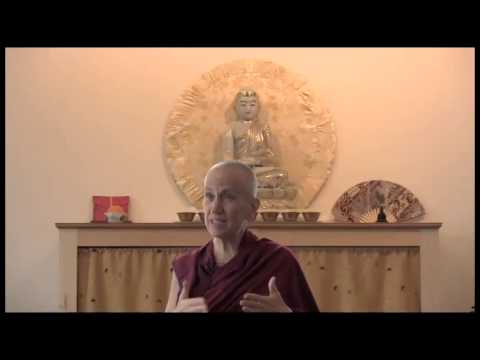Contemplating causality
- Discriminating causality and emptiness from the idea of an external creator
- Investigating our idea of negative and positive karma
- Cleaning up with old assumptions and wrong views
- Not everything happens because of karmic causality. There are other causalities, too!
- Causality means change and if you can change the causes you can change the results
I was going to suggest—because last night we talked so much about causality—that you spend some time meditating on that and really make that a very prominent thing. And it fits in very well with Vajrasattva meditation for a number of reasons. And what’s the difference–because last night we were negating the existence of an external creator who manages the universe. Well, when we visualize Vajrasattva do we sometimes just–the old man in the sky suddenly looks like Vajrasattva. [laughter] You know? But our idea in our mind is very similar.
One of my friends in Jalapa, Mexico, said in his group somebody came in and wanted to know about “Saint Vajrasattva.” “Santo Vajrasattva.” [laughter] So we have to really discriminate: what is the difference between the two of those? And how does this whole idea of causality, and causality fitting in with emptiness, complimenting emptiness, how does this fit in with how we see Vajrasattva. And similarly, when we’re doing the purification, do we see our karmic imprints as something permanent, something truly existent? “I did this however long ago it was and I just feel so bad about it and that’s hanging over my head the whole rest of my life and I can’t get rid of it.” You know, kind of this action, which, when we look at the action the action has causes, it changed moment by moment, and it went out of existence, and there was a karmic seed left. Or, you get into Prasangika, there was a “having disintegrated” left. But in our mind we’ve cast this in concrete. “I did this horrible thing. There’s nothing that can ever undo the energy created from that.”
Look at what your ideas are about negative karma and positive karma. I’m sure we all think our positive karma comes and goes very very quickly and ripens quickly and finished very quickly. But our negative karma is permanent. And it’s this whole thing… Wait until we get into the next chapter of Aryadeva where we’re refuting permanent functional things. That’s what we think our karma is. It’s permanent and it still functions to produce the result of suffering, and it can never be purified, it just always [is].
Do we have that idea of negativity somewhere in the back our minds? Maybe you learned it when you were six years old or something. Or maybe your own mind made it up. But to really bring out those assumptions and kind of underlying ideas we have about things. And ask ourselves if they’re true. Am I grasping on to a permanent cause? Am I holding onto an idea of an external creator whom I’ve got to please? Am I thinking that a discordant cause is the cause of my suffering or my happiness? So really explore your mind and see what kind of assumptions there are there. And use the reasoning the logic to root out these old assumptions. Because these assumptions—if we don’t identify them, if we don’t challenge them—then they create a very strong emotional block in our practice. Because if we have this idea that my negative karma is permanent, there’s nothing I can do about it, then we easily go from there to “therefore, I am a bad person.” Of course, there’s no connection. Making mistaken actions does not mean you’re a bad person. They have no connection to each other. But our mind invents a connection. So my negativities are permanent functional things, that means I’m a bad person, that means I am hopeless, helpless, insufficient, and forget it.
Do you see how these are all views? Yes? These are all ideas. They’re views that’s our mind’s made up. But how much… If we have these kinds of wrong views in our minds, how much that impedes us from growing. And how much it affects us even on an emotional level. Because if you go through this irrational logic that we do that ends up with “therefore I’m insufficient, stupid, and forget it,” then what emotional affect does that have? Then I’m just down all the time. So there’s a relationship between our views and our emotions.
I mean, that’s just one kind of example. But you know, if you have other views… You have people who believe that god is the cause of what happens to them in life, and then when someone dies they get mad at god. Then you waste so much time getting mad at something that doesn’t exist. And it’s torture for that person. So much torture, because their whole faith is cracking apart.
That’s why I’m saying really look in your mind and check out what underlying beliefs there are and then really contemplate on the kinds of views we’re learning, and especially about causality and how causality works.
You know, there are many kinds of causality. One kind of causality is karmic causality. There’s also biological causality, chemical causality, all these other kinds. Psychological. There are many different kinds. Karma is only one thing. So it’s also not totally accurate to think that everything happens because of karma. I asked His Holiness about it, you know, I mean the lack of snow this winter is due to whatever’s going on with the gulf stream moving the water somewhere else. Our living in a place where there isn’t sufficient rainfall, that is influenced by our karma. But the weather being the way it is is just some kind of physical causality going on.
But my whole point here is really think about causality a lot. And when you think about causality, like in our discussion last night, you know, this thing about “well who’s making the decisions anyway?” When you think about causality a lot it loosens things up in your mind and you realize that they aren’t concrete. Because if they’re dependent on causes then they don’t support themselves, they can’t stand on their own energy. They only exist because the causes for them exist. And since causes change, I mean the whole idea of causality means change, it means something is impermanent, it does not endure for the next moment. So if they’re things that are caused, if you can change those causes then you change the results. The results cannot continue if we remove the causes. And it’s possible to remove the causes of negativity and the causes of suffering because they’re all based on wrong views. So if you develop the wisdom that understands things the way they are then those wrong views can get eliminated. Okay? Why? Because they’re just impermanent blips that don’t exist from their own side able to support themselves, powered by their own energy. They’re not powered by their own energy. They’re powered by the energy of what came before them. They’re powered by the energy of the conditions that influence how those causes ripen.
So it gives you then—when you understand this—this whole field in which you can play, because things are not cast in concrete. So you can play. And you can change this, you can change that, then everything changes. Your whole life is not like [rigid], kind of put you in a slide and go kerplunk at the bottom. It makes you see, wow, there’s a whole lot there. Okay? So that gives you much more enthusiasm, doesn’t it? And that also helps us to be more compassionate because when our own mind is happier it’s easier to be kinder and more compassionate to others, too.
Venerable Thubten Chodron
Venerable Chodron emphasizes the practical application of Buddha’s teachings in our daily lives and is especially skilled at explaining them in ways easily understood and practiced by Westerners. She is well known for her warm, humorous, and lucid teachings. She was ordained as a Buddhist nun in 1977 by Kyabje Ling Rinpoche in Dharamsala, India, and in 1986 she received bhikshuni (full) ordination in Taiwan. Read her full bio.


